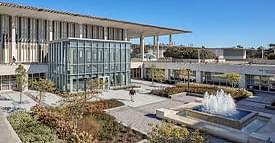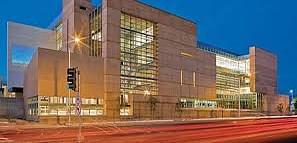Language is a complex, species-specific system made up of several components (sound, sentence structure, and meaning). The study of linguistics gives us a unique window on the structure of the human mind and the mind's activity. Furthermore, there are many real world applications of linguistics (e.g., natural language technologies). Additional information can be found at the?Linguistic Society of America.
Linguistics students will develop critical, scientific thinking skills through learning across several core subfields in linguistic science. Through?course work, students will gain a solid understanding of scientific approaches to the study of language: students will be able to understand scientific arguments; construct arguments; identify regularities and patterns in language; use a variety of linguistic data to test hypotheses. Courses in the linguistics program are designed to present students with information about the main subfields in linguistic science (Morphology, Phonetic, Phonology, Pragmatics, Semantics, and Syntax). Once presented with this information, students will be able to utilize this knowledge to understand, construct and verify arguments (hypotheses and evidence) in each subfield. Specific training in linguistics courses includes how to test theories using empirical methodologies (designing and conducting experiments, looking for naturally occurring linguistic data to verify hypotheses etc.).
Exposure to a scientific approach to language will help students develop critical thinking skills. Students will learn to be soundly skeptical about scientific theories. They will see and learn how to construct arguments for or against these theories. Once students learn scientific and critical thinking in linguistics, they will have a chance to put their experience into practice. For example, students in the linguistic program have the opportunity to get involved in research projects led by faculty members.
Eligibility & Entry Requirement
Academic Eligibility:
- Students must have an official secondary school transcript to get admission.
- Students required to maintain at least a 3.0 overall GPA.
Language Requirments:
- Students whose official language is not English are required to submit IELTS or TOEFL scores.
- Students are required to submit an SAT or ACT score to be considered for admission.
International students who currently or will hold a degree from an institution where English is the primary language of instruction, do not need to submit a TOEFL or IELTS score report.
Scores Required


Do you think the Rankings are wrong ? Report Here
TOP Scholarships
| Scholarship name | Award amount | Eligibility |
|---|---|---|
| - | - | - |
| - | - | - |
| - | - | - |
Key Resources for Your Study Abroad Journey
Scholarship Grants & Financial Aids
| Name | Scholarship Per Student | Level of Study | Type | |
|---|---|---|---|---|
| Innovation in Education Scholarship - La Tutors 123 | Scholarship per student₹ 42,970/Yr$500 | Level Of StudyBachelor | TypeMerit-Based | |
| Gunvant & Bharati Parekh College Scholarship | Scholarship per student₹ 85,940/Yr$1,000 | Level Of StudyBachelor | TypeMerit-Based | |
| Debesh Kamal Scholarship | Scholarship per student₹ 1.2 L/Yr$1,385 | Level Of StudyBachelor | TypeMerit-Based | |
| Ritchie-Jennings Memorial Scholarship Program | Scholarship per studentVariable Amount | Level Of StudyBachelor | TypeMerit-Based |
Similar Colleges


University at Albany


Northern State University


Abilene Christian University
.jpeg?h=143&mode=stretch)

Ohio Northern University


University of South Carolina


University of Akron


State University of New York Polytechnic Institute


University of New Mexico

















.png?h=40&w=40&mode=stretch)





.jpeg?h=40&w=40&mode=stretch)






Comments